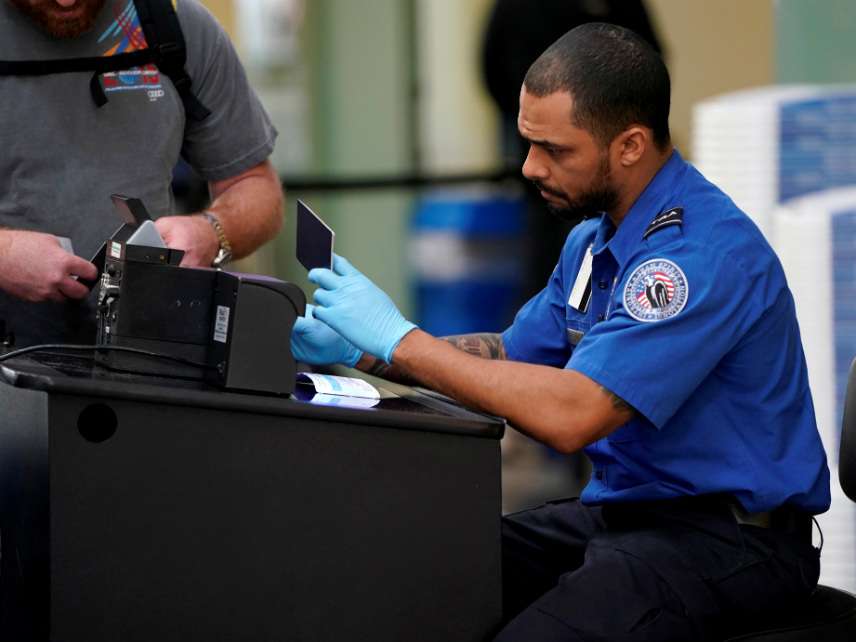Unpaid TSA and FBI Agents Don't Deserve Your Sympathy
The outpouring of emotional and material support for federal workers during the shutdown is understandable, but mistaken.

The partial shutdown of the federal government is entering its second month, with few signs that it will end anytime soon. Continuing right along with it is the national outpouring of sympathy and material support for the some 800,000 federal workers who've either been furloughed or forced to work without pay.
That's been most evident in the one-company town of Washington, D.C., where businesses have been giving away everything from free pizza and beet burgers to heavily discounted microbrews that get cheaper the longer the government shutdown goes on.
Outside the Beltway, state governments are starting to pitch in. In Connecticut, furloughed feds can now apply for zero-interest loans during the shutdown. The Oregon legislature is drafting a bill that would extend eligibility for unemployment benefits to these same folks, while the coastal town of Astoria, Oregon, is waiving their water and sewage bills.
Average citizens are donating free food to TSA agents around the country, while A-list celebrities like Jon Bon Jovi and Gene Simmons have said agents could eat for free at their respective restaurant chains.
This outpouring of sympathy is perfectly understandable on a human level: People are losing out on pay through no real fault of their own, forcing many families to ask how they're going to pay for rent or needed medical care. The unfairness is particularly rankling for the 10,000 air traffic controllers who're being forced to work a demanding, crucial job without being paid.
And yet none of that very real pain erases the fact that we are seeing an incredible outpouring of grief over something private sector workers have to contend with everyday, and who are not guaranteed backpay once the federal government gets itself together. Worse still, this charity is being directed at people whose current jobs—pay or no—are often unnecessary, ineffectual, or even actively harmful.
That's true of the FBI agents, who're fretting that they're less able to entrap people during the shutdown thanks to their snitches having been furloughed.
It's even more true for TSA agents, who are both incredibly ineffectual even when they're being paid in full (the agency's fail rate at catching contraband hovers somewhere between 80 and 95 percent) and whose job requires the violation of the flying public's privacy and dignity on a daily basis.
To be sure, forcing people to work without pay is a pretty messed up thing to do, even if the underlying job is bogus.
Nevertheless, the solution we should be embracing isn't restoring these professional molesters' compensation to 100 percent, but rather to fire all of them, and turn over security to more capable, less handsy private contractors—or, in the case of bureaucrats at the Department of Education, abandoning the work they do altogether.
Instead, the hyper-partisan attitudes the government shutdown has evoked have seen an increasing number of people lionize them, while ignoring a more fundamental question of whether some of these workers should be on the federal payroll in the first place.
Public sector unions are trying to recast the shutdown as an attack on workers everywhere, while labor activists argue in the opinion pages of The New York Times that TSA agents could kickstart a new wave of working class activism. Over at The Seattle Times, columnist Danny Westneat wonders aloud if "the humble TSA agent" could be the key to saving democracy.
The contrast between this near deification of TSA agents and the reality of their jobs is glaring, and hopefully short-lived. Nevertheless, it servers as a reminder of just how overtly political—and misplaced—all the thoughts, prayers, and free pizza flowing toward federal workers really are.
Rent Free is a weekly newsletter from Christian Britschgi on urbanism and the fight for less regulation, more housing, more property rights, and more freedom in America's cities.


Show Comments (163)